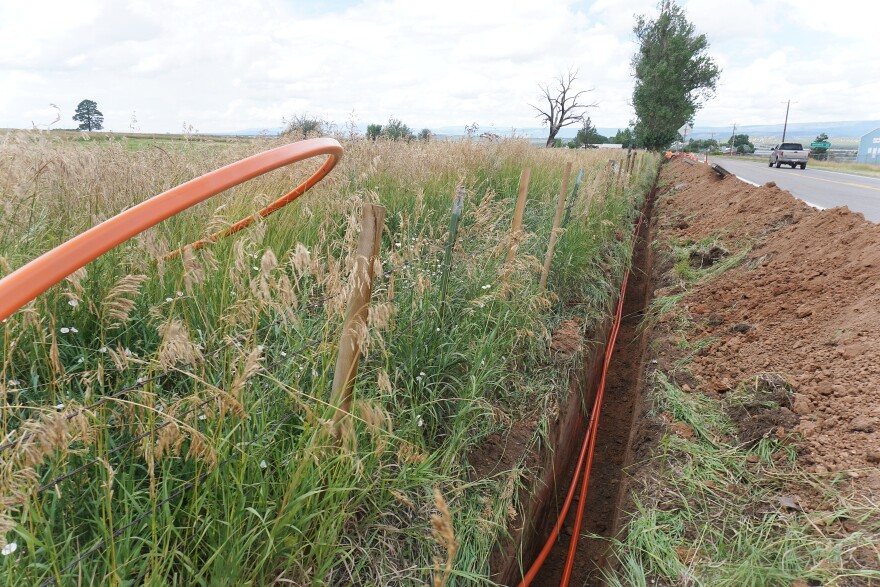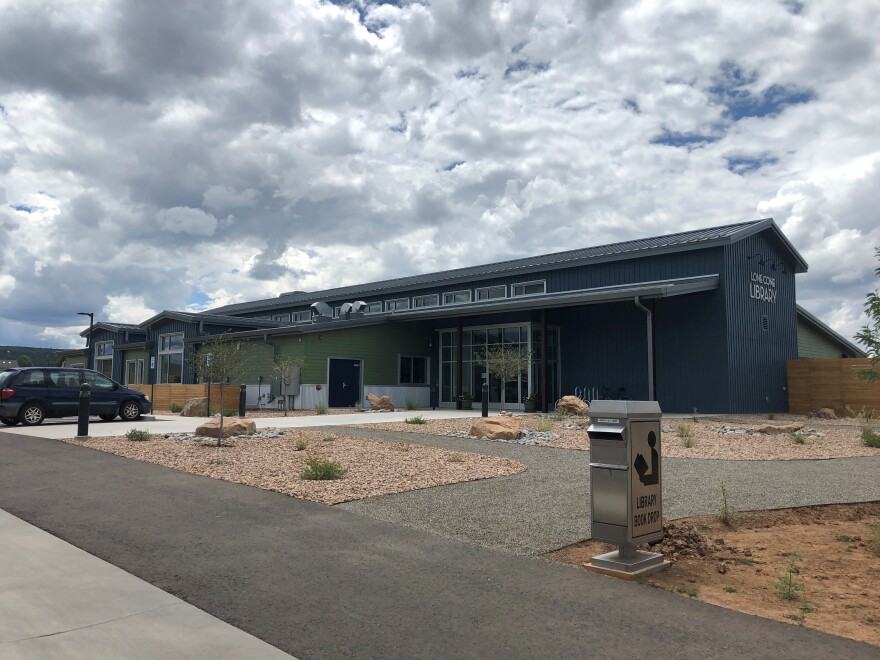Editor's note: This story is the first of a three-part series looking at the state of Colorado's efforts to get rural households connected to high-speed internet.
NORWOOD- People living in the small farming town of Norwood have done some strange things to stay connected to the internet.
For example, librarian Carrie Andrew said the security cameras at the library once captured a young man arrive on his bicycle after hours to utilize the building's blazing fast Wi-Fi.
"The mosquitoes are so bad that he's riding in circles while he's using his phone so the mosquitos won't bite him," Andrew said. "But he was in our parking lot for 30 minutes using our internet because he didn't have access to it anywhere else."
The people trying to change this situation have also found themselves going around in circles sometimes. Erika Lapsys works for , a non-profit that has spent years trying to expand broadband to the rural parts of San Miguel County.

The easiest way to get broadband to Norwood residents would have involved sending the signal through a piece of fiber optic cable that was already buried years ago between the towns of Nucla, Norwood and Telluride.
But some landowners along the route declined to give their permission for a variety of reasons. Lapsys said she couldn't track some of them down to ask them for the easement. And others who did answer the phone demanded a significant amount of money.
"I had a guy, one of the California guys who doesn't come out here very often, who said you can pay me $400 a month for 10 years," Lapsys said. "And I said 'where did you get that number from?' And he said 'well that's what I think it's worth.' Well we're going to go back and forth because I don't think it's worth that."
But Lapsys was still determined to find a workaround. So, the Telluride Foundation and other broadband advocates secured a $760,000 grant from the state and federal governments to build a new fiber optic line around the landowners who wouldn't give their blessing.

After four years of work, the section between Nucla and Norwood is just now being completed.
"Could that money have gone to other places that didn't have existing assets? Probably," she said. "I like to think they gave us the grant because we needed it. Because without it we were stuck."
Now, Lapsys is still trying to convince landowners on the final stretch of the fiber route to Telluride to give their blessing so they won't have to build another costly workaround.
"People want to live here for a number of different reasons, and it's not fair to say well there's no broadband, it's not worth it, you can just leave," Lapsys said. "People have generations who have lived here. And to tell someone that it's not worth it to improve the quality of their living because it's too expensive or it's too hard, it's just not fair."
What's at stake
Stop into the Lone Cone Library in Norwood, and it's easy to see what Lapsys is fighting for.

Thanks to the recent arrival of the fiber, the library just got connected to Clearnetworx, a broadband service that is significantly faster than residents have been able to get. In the computer room, residents are taking advantage of this new service to look up recipes, do homework and catch up on the news.
"I've kind of always felt like Norwood is the ugly stepsister in San Miguel County, but now we're like 'look at us we've got a beautiful brand new library with all this technology and we're really grateful," librarian Megan Coxwell says as she gives a tour of the new building.
She said the new connection will allow more Norwood residents to stay in town and not look for jobs, and better connections, elsewhere.
"We can do whatever you need to do from this tiny little town," she says as she shows off a new room where residents can hold video conferences. "You don't have to leave. Which is nice for a lot of us who don't want to drive 40 miles or 120 miles to get somewhere else."

After first reaching the library, the new fiber connection will soon reach households in Norwood. But some residents in San Miguel County are still being left behind.
Still waiting
Drew and Grant Doorn are trying to make fly fishing apparel look, well, cooler. is full of colorful hats and custom printed tee shirts.
"We're seeing a little bit of the retro 90s stuff becoming a trend this summer," Drew Doorn said.
After finding success at the farmer's market in Steamboat Springs, they took their business to a building that used to be an old train station just outside of Telluride. But they have one big problem.
"We use the line of site microwave internet, which tends to be really spotty," Grant Doorn said. "It really impacts our business in a negative way because sometimes if the internet goes down for a long period of time, we can't print orders. We can't ship orders. So a lot of times we're just dead in the water when the internet goes down."
All of the cities and towns around them are getting connected. But for now, they're still waiting for someone to take on the challenge of bringing them high-speed internet.

"We'd love to get fiber," Grant Doorn said. "We keep hearing rumors of fiber coming, but now I think they're going to bypass us in the canyon and go straight to Telluride, which is a bummer because it's really going to hinder the growth of Placerville."
Capitol Coverage is a collaborative public policy reporting project, providing news and analysis to communities across Colorado for more than a decade. Eleven public radio stations participate in Capitol Coverage from throughout Colorado.





